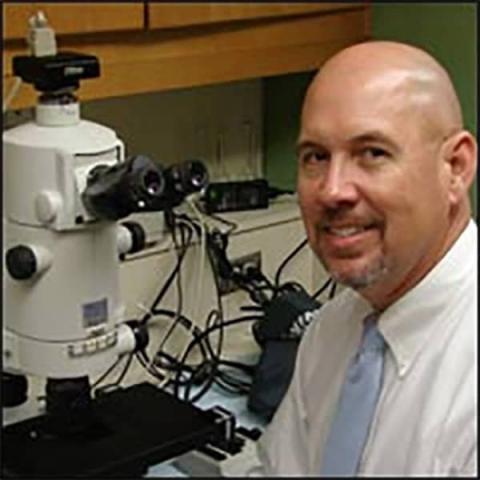Steven M. Hill, PhD
Professor, Edmond & Lily Safra Chair for Breast Cancer Research

Biography
Dr. Hill received his B.S. in Biology from Abilene Christian University in 1980. He conducted his doctoral studies on the cellular mechanisms of the pineal hormone on growth of human breast cancer under the tutelage of Dr. David E. Blask at the University of Arizona, obtaining his Ph.D. in 1986. From 1986 to 1988 Dr. Hill was a postdoctoral fellow with the late Dr. William L. McGuire at the University of Texas Medical Center at San Antonio, working on the molecular mechanisms of estrogen-resistance in human breast cancer. In 1988 Dr. Hill returned to Abilene Christian University where he taught Anatomy/Physiololgy, Cell Biology, and Developmental Biology. In 1989 Dr. Hill joined Tulane University Health Sciences Center in the Department of Structural and Cellular Biology, where he is the course director for Medical Embryology. Dr. Hill has published over 60 manuscripts and book chapters in the area of molecular endocrinology and breast cancer. He is a reviewer for a variety of journals including Cancer Research, Breast Cancer Research and Treatment, and Molecular Endocrinology and has served on NIH, DOD, and NSF grant review panels. The primary focus of Dr. Hill's research is the molecular mechanisms of signal transduction cross- talk in breast cancer. Breast cancer is an endocrine-responsive neoplasm and as such is responsive to a variety of endocrine and growth factor stimuli. A complete understanding of the factors regulating the proliferation breast cancer, as well as an understanding of how these various hormones and factors cross-talk with each other to regulate breast cancer cell growth, is crucial to development of more potent breast cancer therapies. Dr. Hill's laboratory has conducted extensive studies examining the role of mutated estrogen receptors in the development of an estrogen-insensitive/tamoxifen-resistant phenotype in breast cancer. They have identified variant forms of the estrogen receptor that can function independent of hormone stimulation and can act to constitutively drive the mitogenic estrogen-response pathway in breast cancer. More recently, Dr. Hill's laboratory has demonstrated that the pineal hormone melatonin has significant inhibitory effects on the development and growth of human breast cancer. Furthermore, their studies have elucidated that melatonin can potentiate the actions of retinoic acid, a vitamin A derivative, to induce cell death in human breast tumor cells in culture, to prevent the development of carcinogen-induced breast cancer in rats and to induce the regression of over 70% of established breast tumors in rats. These studies currently are being moved into human clinical trials. Finally, Dr. Hill, in collaboration with investigators at Tulane Cancer Center and Xavier University, is examining the cross-talk of signaling pathways such as the melatonin receptor with the retinoic acid receptor and estrogen-receptor in both breast and prostate cancer and how these pathways can be manipulated to provide enhanced therapeutic advantage.
Research
- Aging and neuroendocrine effects on breast cancer
- Circadian rhythms and aging
Tulane Cancer Center Program Member
Endocrine response mechanisms of breast cancer, in particular steroid hormone receptors; neuroendocrine influences on breast cancer.
Publications
Click Here For PubMed Publications
Mao L, Cheng Q, Guardiola-Lemaître B, Schuster-Klein C, Dong C, Lai L, Hill SM. In vitro and in vivo antitumor activity of melatonin receptor agonists. J Pineal Res. 2010 Jul 1.
Dong C, Yuan L, Dai J, Lai L, Mao L, Xiang S, Rowan B, Hill SM. Melatonin inhibits mitogenic cross-talk between retinoic acid-related orphan receptor alpha (RORα) and ERα in MCF-7 human breast cancer cells. Steroids. 2010 Dec;75(12):944-951. Epub 2010 Jun 15.
Hill SM, Cheng C, Yuan L, Mao L, Jockers R, Dauchy B, Frasch T, Blask DE. Declining melatonin levels and MT1 receptor expression in aging rats is associated with enhanced mammary tumor growth and decreased sensitivity to melatonin. Breast Cancer Res Treat. 2010 Jun 12.
Hill SM, Frasch T, Xiang S, Yuan L, Duplessis T, Mao L. Molecular mechanisms of melatonin anticancer effects. Integr Cancer Ther. 2009 Dec;8(4):337-46.
Ramayya MS, Sheng M, Moroz K, Hill SM, Rowan BG. Human steroidogenic factor-1 (hSF-1) regulates progesterone biosynthesis and growth of ovarian surface epithelial cancer cells. J Steroid Biochem Mol Biol. 2010 Mar;119(1-2):14-25. Epub 2010 Jan 4.
Lai L, Yuan L, Cheng Q, Dong C, Mao L, Hill SM. Alteration of the MT1 melatonin receptor gene and its expression in primary human breast tumors and breast cancer cell lines. Breast Cancer Res Treat. 2009 Nov;118(2):293-305. Epub 2008 Nov 4.
Lai L, Yuan L, Chen Q, Dong C, Mao L, Rowan B, Frasch T, Hill SM. The Gαi and Gαq proteins mediate the effects of melatonin on steroid/thyroid hormone receptor transcriptional activity and breast cancer cell proliferation. J Pineal Res. 2008 Nov;45(4):476-88. Epub 2008 Aug 13.
Xiang S, Coffelt SB, Mao L, Yuan L, Cheng Q, Hill SM. Period-2: a tumor suppressor gene in breast cancer. J Circadian Rhythms. 2008 Mar 11;6:4.
González A, Martínez-Campa C, Mediavilla MD, Alonso-González C, Sánchez-Mateos S, Hill SM, Sánchez-Barceló EJ, Cos S. Effects of MT1 melatonin receptor overexpression on the aromatase-suppressive effect of melatonin in MCF-7 human breast cancer cells. Oncol Rep. 2007 Apr;17(4):947-53.
